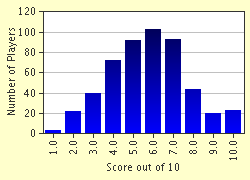Quiz Answer Key and Fun Facts
1. 'We have only to kick in the door and the whole rotten structure will come crashing down'.
2. 'I am not a crook'.
3. 'Peace for our time'.
4. 'The______________ will sell us the rope with which we will hang them'.
5. In the latter half of the 20th century Communist China underwent a number of ideological upheavals which were given uplifting slogans somewhat at odds with their outcome. Which of these came first?
6. During the settlement of the old west promoters encouraged settlers with the slogan '__________ follows the plough'.
7. At the beginning of WWII in September 1939 the following statement was made at a meeting of senior Luftwaffe officers: 'No enemy bomber can reach the Ruhr. If one reaches the Ruhr my name is not ________. You can call me Meyer!' Who?
8. What was 'The China Incident?'
9. In May 2003 President George W Bush declared an end to major combat operations in Iraq on the deck of the carrier USS Abraham Lincoln in front of a large banner which read 'Mission ______.'
10. In Nazi Germany the sign 'Arbeit macht __________' was a symbol of the horrors of this regime. What was the missing word?
Source: Author
mstanaway
This quiz was reviewed by FunTrivia editor
bloomsby before going online.
Any errors found in FunTrivia content are routinely corrected through our feedback system.

